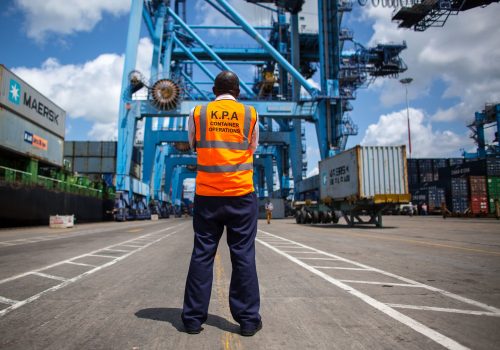As the global community continues to grapple with the coronavirus (COVID-19), the Atlantic Council is open for business. Our business, meetings, and events, however, are occurring virtually. For more information, please read an update from our President and CEO.
As Latin America and the Caribbean continues to battle with the COVID-19 pandemic and its socioeconomic costs, illicit trade markets are thriving and re-shaping supply chains. Illicit trade puts consumer safety at risk, affects government revenue and its ability to provide services, and erodes the business environment. How has the pandemic affected illicit trade flows across the region? What best practices can Latin America and the Caribbean offer on combatting illicit trade and what are lessons from other regions? How can governments, the private sector and civil society work together to reduce illicit trade?
Join the Atlantic Council’s Adrienne Arsht Latin America Center on Tuesday, November 24, from 3:00 p.m. to 4:00 p.m. EST for a virtual conversation on the impact of COVID-19 on illicit trade in Latin America and the Caribbean, with new data and numbers from an upcoming Euromonitor report.
Speakers*
Bosco Marti
Director of Institutional Affairs and Communications, Aleatica
Former Executive Director (2014-2020), Inter-American Development Bank
Jeffrey P. Hardy
Director-General
Transnational Alliance to Combat Illicit Trade (TRACIT)
Virginia Cervieri
Co-Founder and Senior Partner
Cervieri Monsuárez
Lilian Verena Hoenigsberg Krohn
Consultant
Euromonitor International
*Additional speakers to be confirmed.
Moderated by
Jason Marczak
Director, Adrienne Arsht Latin America Center
Atlantic Council
Event recap
By Daniel Payares
On November 24, the Atlantic Council’s Adrienne Arsht Latin America Center hosted an event to discuss illicit trade markets in the region amid the COVID-19 pandemic. The panel included Bosco Marti Ascencio, director of institutional affairs and communications at Aleatica and former executive director for Mexico and the Dominican Republic at the Inter-American Development Bank; Virginia Cervieri, co-founder and senior partner at Cervieri Monsuárez; Jeffrey Hardy, director-general of the Transnational Alliance to Combat Illicit Trade; and Lilian Verena Hoenigsberg Krohn, consultant at Euromonitor International. Jason Marczak, director of the Adrienne Arsht Latin America Center at the Atlantic Council, moderated the conversation.
Jeffrey Hardy opened the exchange by saying that illicit trade is not a new phenomenon in the region. Traditionally, it has been fostered by the existence of free trade zones–like Colon in Panama, Corozal in Belize, or Maicao in Colombia–and the existence of tax havens that allow for money laundering.
Hoenigsberg, who co-authored a recent study on the illicit spirits trade, mentioned that in 2020, illicit spirits consumption grew at an average of 9.7 percent in Brazil, Colombia, Dominican Republic, Mexico, Panama, and Peru. This is equivalent to 200 million liters of alcohol. Hoenigsberg identified a diminished purchasing power and lower supply of spirits as key factors behind this rise of illicit spirits trade.
Hoenigsberg added that several problems emerge from the illicit spirits trade. First, illicit spirits represent a health risk that can lead to blindness or even death due to the high content of methanol. Another consequence is the loss of fiscal revenue by governments. Finally, the illicit spirits trade damages the beverage industry, harming brands’ reputation.
Bosco Marti stated that illicit trade impacts economic prosperity on three dimensions: Fiscal revenue, unfair competition, and security. Government’s fiscal capabilities are affected through the reduction of tax revenues, undermining the provision of public goods and services that are key to increase people’s wellbeing. Also, illicit trade hinders fair competition, affecting legal business and producers. This reduces economic opportunities and disrupts supply chains across the region. Besides, consumer safety is also endangered as some illicit products entail phytosanitary risks that compromise public health. Finally, it harms public security and the rule of law by strengthening organized crime.
Hardy complemented Marti’s point of view adding that illicit activities hold back Small and Medium Enterprises’ (SME’s) formalization. As SME’s face illegal competition, they see fewer incentives to move to the formal economy, affecting job creation, productivity, and competition.
Virginia Cervieri emphasized the growth of online markets during the pandemic and how this creates risks. Consumers are not always able to differentiate if they are buying an illicit product or a legal one (e.g. sometimes images of the original product are advertised while the product being sell is a counterfeit). The digital space is also more challenging for authorities, who have fewer enforcement capabilities than in the physical space.
Marczak asked Cervieri about the risks of COVID-19 vaccine’s counterfeit, to which she responded that sometimes people register the names of the vaccines without having them, so that whenever the genuine product arrives in the country, the local owner of the trademark can stock commercialization or request a fee for its distribution. This is not a counterfeit problem but an issue with trademark offices.
Regarding strategies to fight illicit trade, all participants agreed that governments, the judicial branch, and the private sector need to collaborate to reduce it. Governments and the private sector can help to improve consumer awareness through media campaigns. They must also use existing regulations and improve legal frameworks depending on the circumstance. Special attention should be devoted to social media and new platforms used for transactions, a trend that has been accelerated by the pandemic and that can create serious problems regarding illicit activities. Besides, greater coordination among the authorities and the private sector is critical to advance law enforcement.
Daniel Payares is an intern at the Adrienne Arsht Latin America Center.
